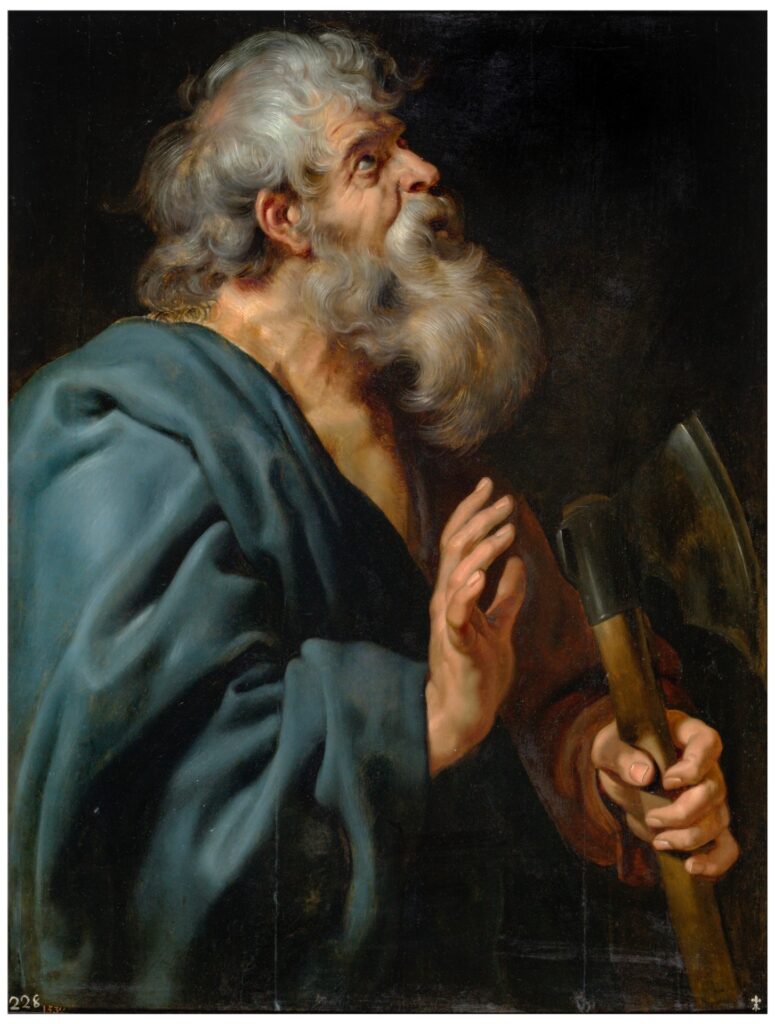* * * *

* * * *
Monday, February 24, 2025, is the Feast of St. Matthias, the Apostle who replaced Judas:
[A]ccording to the Acts of the Apostles, [he] was the apostle chosen by the remaining eleven apostles to replace Judas Iscariot following Judas’ betrayal of Jesus and suicide. His calling as an apostle is unique in that his appointment was not made personally by Jesus, who had already ascended to heaven, and, it was made before the descent of the Holy Spirit upon the early Church.
See Saint Matthias – Wikipedia. (Note that this St. Matthias is not to be confused with St. Matthew, the Gospel-writer whose Feast Day is September 21.) He is also called “Unremarkable Matthias” or the “Overlooked Apostle.” See The Overlooked Holy Apostle, Matthias.
Isaac Asimov described how Matthias became an Apostle:
Peter arranged to have a new individual selected to take the place of Judas Iscariot in order to bring the number of the inner circle back to the mystical twelve that matched the twelve tribes of Israel. Two were nominated, Joseph Barsabbas and Matthias. To choose between the two, lots were used, as told in Acts 1:26, “and the lot fell upon Matthias; and he was numbered with the eleven apostles.” Neither Joseph Barsabbas nor Matthias are mentioned anywhere else in the New Testament.
Since there’s no other mention of Matthias in the Bible, we know next to nothing about him. But there are theories. For example, Wikipedia suggested that “Matthias was originally Zacchaeus.” (Remember, the tax collector Zacchaeus who climbed a sycamore tree so he could see Jesus? He had a hard time both as he was short and because of the crowd of people.)
So, was Saint Matthias really Zacchaeus, who fell from a sycamore tree?
Whatever the answer, the now-defunct article – Overlooked Apostle – went into great detail about how much Matthias suffered – and how he ultimately died. Like, he preached in Macedonia and Ethiopia, where “the heathen dragged him over the ground, beat him, hung him from a pillar and tore his stomach with an iron blade and burned him with fire.” Another town he preached in was a “city of the man-eaters,” cannibals. When Matthias came in “the men of that city took hold of him and thrust out his eyes and made him drink poison and sent him to the prison where he sat for thirty days waiting to be eaten and die.” But the Lord appeared to him and got his eyesight back for him, as well as other prisoners who’d suffered the same fate. The site also said Matthias was rescued by the Apostle Andrew; “as Andrew approached the gates of the prison, the doors opened of their own accord.” (But see also Matthias the Apostle – Wikipedia, which said “information concerning the ministry and death of Matthias is vague and contradictory, and that Hippolytus of Rome said Matthias “died of old age in Jerusalem.”)
That Wikipedia account may be true but it’s also a whole lot more boring! (And which indicates how internet users need to Lateral Read and check sources, including but not limited to claims seeming outrageous – or “not boring.”) Getting back to the now-defunct “Overlooked” article, it said eventually Matthias returned to Galilee where he was stoned to death. “The Jews, filled with malice and anger, seized Matthias and presented him to the High Priest, Annas.” The High Priest, who “hated all Christians and was responsible for the death of James, the first bishop of Jerusalem, ordered that Matthias be stoned.” One point of note: Overlooked Apostle said that when Matthias was taken to be stoned, he cried out, “You hypocrites, rightly did the Prophet David speak to those like you: ‘they shall hunt down the soul of the righteous man, and the innocent blood shall they condemn.’” (Which sounds strangely pertinent these days.)
After Matthias spoke these words, two witnesses who claimed he’d blasphemed picked up stones to be the first to stone him. But first, Matthias asked that these stones be buried with him as a testimony of his suffering for the Lord. So they stoned him to death, and as an added insult, also beheaded him to express that he was an enemy of Rome. So whether St. Matthias died by being first stoned and then beheaded, or had his eyes gouged out, then “sat for thirty days waiting to be eaten and die,” the lesson is: Being an apostle was no piece of cake!
Another lesson? Maybe there’s a reason the “Overlooked” piece is NOW DEFUNCT, but the main point remains: Trying to be a good Christian has never been a “piece of cake.” (And these days it’s mostly a pain in the ass.) As to who was Matthias, and how did he die? That’s one puzzle we Good Christians can work on this Lent. (As a spiritual discipline?) There’s also that whole controversy, “should I judge my fellow Christians?” I’ll explore that topic in a near-future post, in which I’ll revisit the March 2019 post, On the Bible’s “dynamic tension,” featuring Charles Atlas.
Stay tuned…
* * * *

* * * *
The upper image is courtesy of Saint Matthias – Wikipedia. The caption, as noted: “‘St Matthias’ (c. 1611) by Peter Paul Rubens.“
The Book of Common Prayer reference: The “corporate-mystical” prayer is on page 339, the post-communion prayer for Holy Eucharist, Rite I.
“Feast days” are designated days on the liturgical (church) calendar “set aside to commemorate events, saints, or doctrines that are important in the life of the Church. These can range from Solemnities, which are the highest-ranking feast days like Easter and Christmas, to optional memorials that celebrate lesser-known saints.” Feast Days: Celebrating the Church’s Calendar.
Bibliography for this post: 2015’s On St. Matthias – and “Father Roberts”,” 2017’s The “Overlooked Apostle,” Ruth and Mardi Gras, and 2022’s St. Matthias, Zacchaeus, and the tough life of an Apostle.
Re: “Isaac.” The quote is from Asimov’s Guide to the Bible (Two Volumes in One), Avenel Books (1981), page 998. Asimov was “an American author and professor of biochemistry at Boston University, best known for his works of science fiction and for his popular science books. Asimov was one of the most prolific writers of all time, having written or edited more than 500 books and an estimated 90,000 letters and postcards.” His list of books included those on “astronomy, mathematics, the Bible, William Shakespeare’s writing, and chemistry.” He was a long-time member of Mensa, “albeit reluctantly; he described some members of that organization as ‘brain-proud and aggressive about their IQs.’” See Isaac Asimov – Wikipedia.
Re: That “mostly a pain in the ass” comment. Which may be true of this earthly incarnation, but there is that “you have already won your game of life” part. (John 6:37 and Romans 10:9.)
The lower image is courtesy of Dynamic Tension Charles Atlas – Image Results. See also Dynamic Tension – Wikipedia, and Charles Atlas – Wikipedia.
* * * *